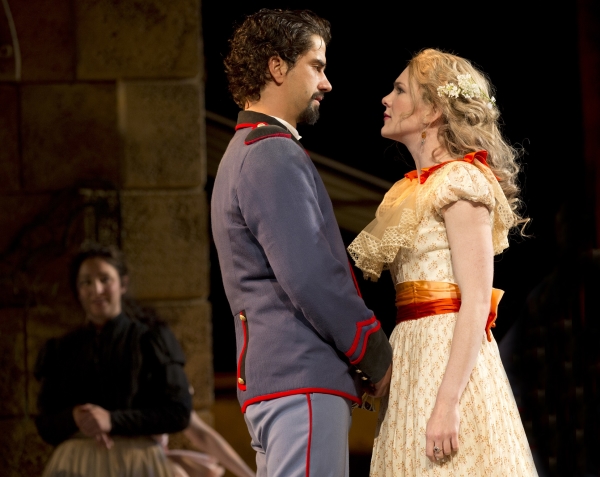Much Ado About Nothing

(© Joan Marcus)
Few things are more delightful about a summer in New York City than Shakespeare in the Park, an annual tradition of free performances produced by The Public Theater at the Delacorte Theater. The mere feeling of watching Shakespeare in this dramatic outdoor setting has kept audiences rapt for over 50 years. So one would expect that a showing of Shakespeare's wittiest comedy, Much Ado About Nothing, would have theatergoers rolling in the aisles with giddy delight. Unfortunately, despite some excellent performances and beautiful design, this overserious and overlong production misses the mark.
Returning from battle, Don Pedro of Aragon (Brian Stokes Mitchell) stops to rest his army at the home of Leonato (John Glover), governor of Messina. Pedro's lieutenant, Claudio (Jack Cutmore-Scott), instantly falls for Leonato's daughter, Hero (Ismenia Mendes). Meanwhile, Claudio's fellow-in-arms, Benedick (Hamish Linklater, sporting some truly wild sideburns), is less than taken with Leonato's sharp-tongued niece, Beatrice (Lily Rabe). The feelings are mutual, and the two engage in a war of words and unrivaled Shakespearean shade.
While everyone prepares for the wedding of Claudio and Hero, Don Pedro embarks on a scheme to turn Beatrice and Benedick's malice into red-hot love. At the same time, Pedro's illegitimate brother, Don John (Pedro Pascal), plots to ruin the Claudio-Hero union by convincing Claudio that Hero regularly hosts a parade of men in her bedchamber. (She doesn't.) Claudio calls Hero out on her iniquity while they're standing at the altar, casting a shadow of gloom over this hitherto sunny affair. But maybe, with some crack police work from constable Dogberry (John Pankow) and a Romeo & Juliet-inspired fake-out from Friar Francis (Austin Durant), love can win out.
Rabe and Linklater are at the top of their games, giving us a Beatrice and Benedick for the ages. Their repartee has all the wit, vim, and vigor one would expect, with an added animalistic sexual tension that is thrilling to behold. While their scenes seem to fly off the stage, the times between them seem to grow longer as the play progresses.
Much as he did with his recent plodding production of Macbeth, director Jack O'Brien takes a more-is-more approach, with similar results. He's made few cuts to the text, stretching the run time to almost three hours. David Yazbek's original music is fun and jaunty in the hands of the four-piece band, and it is always a pleasure to hear Mitchell sing. But it becomes increasingly dour in the funereal second act, making us question if we're actually viewing a comedy. O'Brien populates John Lee Beatty's lavish Mediterranean estate set (complete with tomatoes ripening on the vine) with bickering Sicilian peasantry. Yet even their charming squabbles in Italiano cannot lift the cloud that surrounds this deadly serious production that often seems to feature more shouts and tears than coquettish giggles.
O'Brien leans into the aspects of this play that make it problematic for modern audiences. For instance, if your fiancé embarrassed you at the altar in front of all your friends and family, calling you a "rotten orange" and "approved wanton," would you take him back after it was proven that you are nothing of the sort? Hero does, but one wonders whether this is entirely at the bidding of her red-faced father. (Glover spends a seemingly interminable scene screaming about Hero's shame. He starts the scene at level 10 and ends at 9.) On top of this unabashed patriarchy, there's Shakespeare's disdain for illegitimate children, made manifest in the "plain-dealing villain," Don John, whose bastardy is the only explanation for why he is such a bastard. (At least the villainous bastard Edmund gets more of a fair hearing in King Lear.) The often-excellent Pascal seems at a loss for how to provide Don John with any depth and instead falls back on a Snidely Whiplash-esque caricature.
This is not to say that Much Ado About Nothing must always be completely lost on 21st century audiences. Indeed, the Public's own Mobile Shakespeare Unit toured a very moving and hilarious rendition to the city's prisons and recreation centers just last year. Artistic Director Oskar Eustis mentions that austere and highly edited 100-minute production in his program note, making us long for a Much Ado not so weighed down by sadness and spectacular production value.
Of course, design spectacle need not be a hindrance to good Shakespeare. Don Pedro's army is festooned with buttons, stripes, sashes, and sabers. Jane Greenwood's gorgeously authentic costumes place the show firmly in the 19th century, in the period of Italian unification. This was a time when the city of Messina regularly rebelled against its Bourbon overlords. While the image of Don Pedro's handsomely outfitted army occupying the home of the governor of this wayward and poor territory lends itself to plenty of built-in dramatic tension from a historical sense, O'Brien never really does anything with this gift from his costume designer.
Despite these disappointing missed opportunities, it's impossible not to enjoy seeing first-class actors perform Shakespeare under the stars. Really, how can you not laugh at the sight of Linklater dangling from an orange tree? It's hard to sap the fun out of this excellent comedy, but this production comes dangerously close.











